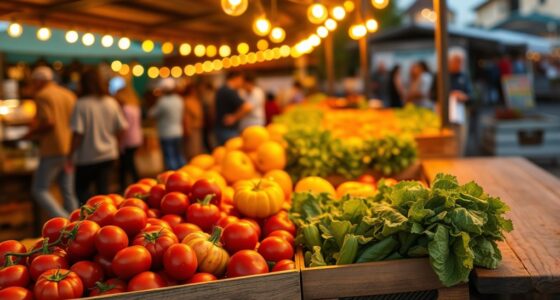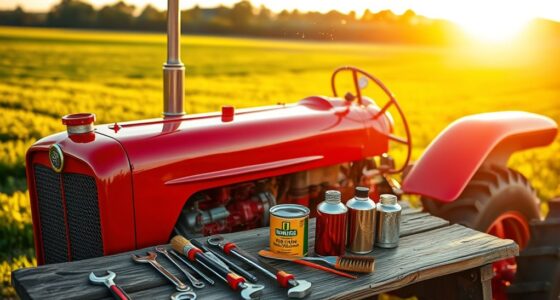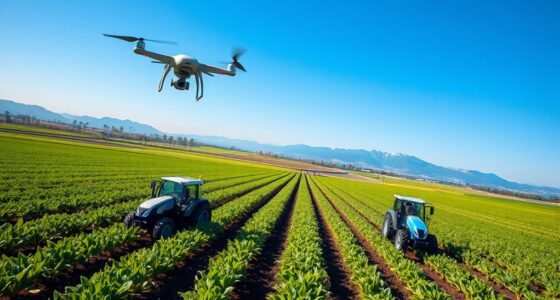To run a successful small farm, you need essential tools like hand trowels, pruning shears, and garden forks for planting, pruning, and soil care. Use these tools to manage pests organically, maintain cleanliness, and support healthy plant growth. Proper organization and regular maintenance extend their lifespan and ensure safety. Keep tools durable and eco-friendly to minimize waste. Stay tuned—there’s more to discover about building your perfect farm toolkit.
Key Takeaways
- Hand tools like trowels, pruning shears, and garden forks are essential for planting, pruning, and soil management.
- Proper organization, sanitation, and maintenance of tools extend their lifespan and ensure safe, efficient farm operations.
- Using sharp, well-maintained tools minimizes plant stress and promotes healthy growth through clean cuts.
- Incorporating sustainable practices, such as proper storage and tool care, supports eco-friendly farming.
- Tools that support pest control and soil health are crucial for organic management and overall crop productivity.

A good set of hand tools is essential for daily tasks, from planting seeds to harvesting crops. Items like trowels, pruning shears, and garden forks are versatile and durable, making your work easier and more precise. When you’re dealing with organic pest control, these tools help you target pests directly, minimizing collateral damage to your plants and the surrounding soil. Using sharp, well-maintained tools ensures clean cuts and reduces plant stress, which supports healthier growth and resilience against pests naturally. Keep these tools organized and sanitized to prevent the spread of diseases and maintain their effectiveness over time. Additionally, incorporating techniques that align with the power of the subconscious during sleep can help reinforce your commitment to sustainable practices. Regularly inspecting and maintaining your tools, such as sharpening blades and replacing worn handles, can improve their longevity and effectiveness. Additionally, understanding integrated pest management can help you develop a comprehensive pest control strategy that minimizes chemical use and promotes ecological balance. Proper irrigation techniques ensure your plants stay healthy and resilient, further supporting your organic farming goals.
Frequently Asked Questions
How Do I Choose the Right Tools for My Specific Farm Needs?
When choosing tools for your farm, focus on your specific needs and farm size considerations. Evaluate the tool selection criteria like durability, versatility, and ease of use. Think about the scale of your operation—larger farms may require more heavy-duty equipment, while smaller setups benefit from multi-purpose tools. Prioritize quality over quantity, and consider how each tool fits into your daily tasks to make the best choices.
What Safety Equipment Should I Have Alongside Farm Tools?
You should always have personal protective gear like gloves, goggles, and sturdy boots ready to keep yourself safe while working with farm tools. Emergency safety equipment such as a first aid kit, fire extinguisher, and eye wash station are essential for handling accidents. Always wear the appropriate protective gear and keep emergency equipment accessible, so you’re prepared for any unexpected injuries or hazards on your farm.
Are There Eco-Friendly or Sustainable Tool Options Available?
Are you looking for eco-friendly tools to reduce your farm’s environmental impact? You’ll find organic alternatives and tools made from biodegradable materials that are just as effective as conventional options. Have you considered bamboo-handled tools or recycled metal equipment? These choices help you farm sustainably while protecting the planet. Isn’t it rewarding to work with tools that support your farm’s health and the environment simultaneously?
How Often Should I Maintain or Replace My Farm Tools?
You should follow a regular tool maintenance schedule to keep your equipment in top shape, inspecting for wear and tear weekly or monthly. Replace tools according to the tool replacement guidelines, which depend on usage and condition. Sharp blades, for example, should be sharpened or replaced when dull, and broken parts need immediate attention. Staying proactive guarantees safety, efficiency, and longevity for your tools, saving you money and effort in the long run.
Can I Find Affordable Tools Suitable for Small-Scale Farming?
Finding affordable tools is like hunting for hidden gems—you just need to know where to look. You can find cost-effective equipment and budget-friendly options at local farm co-ops, online marketplaces, or secondhand stores. Don’t overlook DIY solutions for certain tasks. With some research, you’ll discover tools that fit your small farm’s needs without breaking the bank, helping you stay efficient and economical as you grow.
Conclusion
Remember, a well-equipped farm runs smoothly, and every tool has its purpose. With the right essentials, you’ll save time, reduce effort, and boost productivity. Keep in mind the adage, “A stitch in time saves nine”—investing in quality tools now prevents bigger problems later. Stay prepared, stay efficient, and watch your small farm thrive. Equip yourself wisely, and you’ll turn your farm into a successful, sustainable enterprise.










